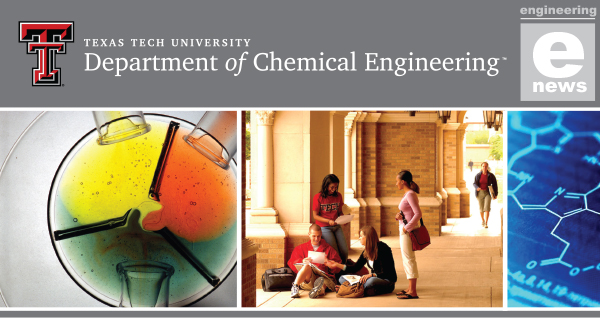
Faculty News
Dr. Sheima Khatib received a Visiting Faculty award to work at Brookhaven National Laboratory this past summer. Dr. Khatib's research focuses on atomic and nanoscale aspects of heterogeneous catalysis, including catalyst synthesis, structural characterization, and catalytic reactor engineering. One of her current research topics focuses on the catalytic methane aromatization process, which is a sustainable reaction for the direct conversion of methane, from natural gas, to higher value products, namely, benzene and hydrogen. To do this, her laboratory is developing novel zeolite-supported metal carbide catalysts with improved benzene selectivity and lower propensity to deactivation by carbon deposition. She is also investigating the evolution of supported mixed metal oxide catalysts, with the goal of understanding, at a molecular level, what structural changes are taking place in the active phases during the aromatization reaction. Her work combines both ex situ and in situ and operando characterization techniques, to obtain a more realistic picture of the structural changes that take place in the catalytic phases under dynamic reaction conditions. At Brookhaven, she had access to the user facilities to perform advanced synchrotron-based x-ray studies to determine the chemical and electronic properties at catalytically active sites under different reaction conditions. Although she and her graduate students are still analyzing the data obtained in the summer, the results are anticipated to provide a deeper understanding of the catalytic process at a molecular level and to facilitate the rational design of catalysts for methane aromatization.

Dr. Nurxat Nuraje spent the summer conducting research at Wright-Patterson Air Force Base as a US Air Force Research Laboratory (AFRL) Summer Fellow. Dr. Nuraje's research focuses on designing, fabricating, and investigating the behavior of nanostructured materials, including inorganic catalytic and photo-catalytic and zwitteronic polymeric nanomaterials, with applications in the areas of solar energy conversion, environmental remediation, petroleum, and nanomedicine fields. For example, one of his current projects involves design and fabrication of highly efficient photocatalysts which can split water under solar irradiation, thus storing solar energy in a simple chemical energy form such as hydrogen. The produced hydrogen can be further applied to produce electricity via a fuel cell. The resulting byproduct is water and is environmentally benign. The technology is cost-effective, a clean energy source, and may reduce the use of fossil fuels, a source of environmental pollution and global warming. Another project funded by ACS Petroleum Research Foundation is to develop novel zwitterionic polymers which can prevent the formation of paraffins in crude oil, and thus, minimize blockage of oil pipelines during transporting crude oil. At Wright-Patterson, he worked with engineers in the materials and manufacturing directorate on nano- and hetero-structured materials fabricating nanocomposites with tunable optical and electric properties.
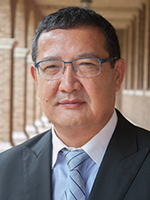
Dr. Wei Li has built a state-of-the-art Biomaterials and Surface Bioengineering Laboratory since arriving at Texas Tech in 2014. One of his current projects aims to develop microfluidic technologies to isolate circulating tumor cells (CTC) from blood and subsequently release the cells without damaging them so that they can be characterized. This last step is what differentiates Dr. Li's efforts from other researchers in the field, and it is expected to facilitate not only the early detection of cancer, but also monitoring of cancer progression and development of patient-specific drug therapies. The exciting work has recently been published in Lab-on-a-Chip and ACS Applied Materials & Interface, and based on this, Dr. Li's graduate student, Ziye Dong, will receive the prestigious Biomedical Engineering Society (BMES) Graduate Student Design and Research Award in October. Dr. Li's lab is also developing a novel microchip that can capture CTCs and analyze their metastatic potential at the same time, which is expected to provide new insight into the heterogeneity of CTCs. Dr. Li's research in this area is supported by a grant from the Cancer Prevention Research Institute of Texas (CPRIT).
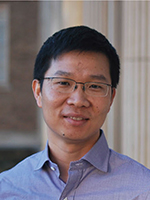
Dr. Gregory B. McKenna was elected Fellow of the North American Thermal Analysis Society (NATAS) in August. Dr. McKenna has earned a reputation as a pioneering researcher in polymers and materials engineering, including the physics of glasses, polymer rheology, nonlinear viscoelasticity, and the mechanics of elastomers and gels. He has recently reported exciting work from his group on 20 million-year-old amber that challenges current paradigms in glass physics. He and his collaborators and students have also recently demonstrated for the first time the creation of an ultradense polymer film by the novel vapor-deposition method of vacuum pyrolysis. Other activities include circular DNA rheology, crystallization from the amorphous vitreous state and non-linear mechanics of polymers. Dr. McKenna, along with coauthor Dr. Sindee Simon, was also recently honored with a featured review on polymer glasses for the 50th anniversary of Macromolecules.

Dr. Ya-Wen (Winnie) Chang is the newest tenure-track faculty member to join Chemical Engineering, arriving in Spring of 2017 as an Assistant Professor. Dr. Chang's degrees are both in chemical engineering, with an undergraduate degree from the National Taiwan University and Ph.D. from Texas A&M University in the area of pickering emulsions and discotic suspensions. She also has four years of postdoctoral experience at Georgia Tech, where she studied biological systems under confinement. Here at Texas Tech, Dr. Chang is building a Soft Matter laboratory to investigate important problems ranging from geometric and mechanical control of cell organization to biomimetic and active materials. In one of her current projects she is investigating a new approach to attaching particles to the surfaces of oil drops, which will be used to make responsive emulsions for applications in enhanced oil recovery, food, and biomedicine. In addition to her research and mentoring of undergraduate and graduate students, Dr. Chang teaches Reaction Engineering to the juniors and an elective on Soft Matter.
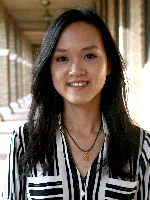
Dr. Gregory Fernandes joined the department as a Research Assistant Professor in Spring of 2017. Dr. Fernandes, who has undergraduate and graduate degrees in chemical engineering from Mumbai University and Texas A&M University, respectively, worked as a Ph.D. researcher at Milliken & Company for eight years in the areas of encapsulation, surfactants, colloids, polymers, and colorants. Dr. Fernandes' research at Texas Tech will use his experience with visual cues to develop cheap, easy-to-assemble sensor technologies for early diagnosis of infection, high-throughput drug screening, and rapid identification of environmental toxins. Dr. Fernandes is enjoying the challenge of transitioning from industrial research to academics where working with and training students is the first priority. He is teaching Engineering Analysis to the freshmen and Mass and Energy Balances to the sophomores.
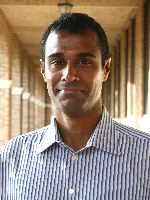
Edward E. Whitacre Jr. College of Engineering
-
Address
100 Engineering Center Box 43103 Lubbock, Texas 79409-3103 -
Phone
806.742.3451 -
Email
webmaster.coe@ttu.edu


